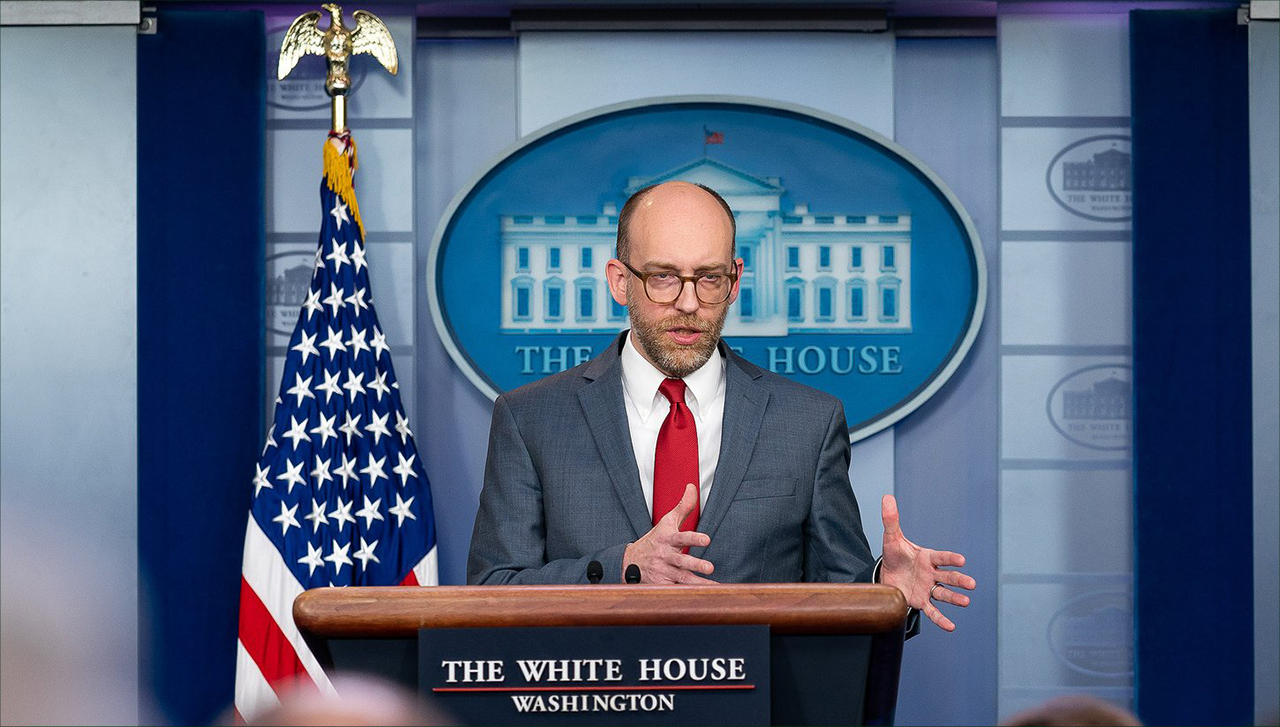Boldly Committed to Truth Telling in the False Face of Fakery
Press Briefing by Press Secretary Sarah Sanders and OMB Acting Director Russell Vought
Press Release:
James S. Brady Press Briefing Room • March 11, 2019 • 2:13 P.M. EDT

OMB Acting Director Russell Vought informs the press: Above. (White House photo) Click image to expand.
MS. SANDERS: Good afternoon. President Trump's 2020 budget, which was released today, builds upon incredible success and keeps his promises to the American people. It continues the President's pro-job creation policies, keeps taxes low, combats the opioid epidemic, protects our veterans, defends our nation, and secures our borders.
Even with a strong economy, deficits are still a threat, and this budget demonstrates the President's vision to restrain Washington spending and reach a balanced budget by 2034. This is a clear roadmap for a more fiscally responsible future if Congress chooses to follow it.
To talk about the President's budget proposal and take questions on the topic, I'd like to bring up Acting Director of OMB Russ Vought.
After that, I'll be back up to take questions of the day.
ACTING DIRECTOR VOUGHT: Thanks, Sarah. Good afternoon everyone. Happy budget day.
Q Happy budget day.
ACTING DIRECTOR VOUGHT: Today we have released the President's fiscal year 2020 budget, "A Budget for a Better America: Promises Kept. Taxpayers First." This budget reflects the President's priorities to ensure that all Americans can benefit from the nation's historic economic boom and record-low unemployment.
No President has done more in two years to strengthen our military, restart our economy, and reform our government than President Trump - promises he made while running for office.
This great progress is threatened by our unsustainable national debt, which has nearly doubled under the previous administration and now stands at more than $22 trillion. Annual deficits are continuing to rise and will exceed a trillion dollars a year. And it's projected that interest payments on the national debt will exceed military spending by 2024. Washington has a spending problem and it endangers the future prosperity of our nation for generations to come.
This budget contains nearly $2.7 trillion in savings, more spending reductions proposed than any administration in history. This budget will balance in 15 years.
Last year, President Trump directed federal agencies to meet a target of a 5 percent reduction to non-defense discretionary spending. I'm proud to report to you today that we have achieved that target.
In terms of the economy, our GDP grew by 3.1 percent over the four quarters of fiscal year 2018. While many claimed we were guilty of wishful thinking, we've met our economic forecast two years in a row - the first administration to ever do that.
We are confident that the President's historic tax reforms, deregulation, trade policy, unleashing American energy will continue our economic growth. Economic policies in this budget will generate more than enough revenue to pay for the cost of the tax cut.
The fiscal year 2020 President's budget outlines a number of key priorities for the administration to continue to pursue. The budget supports public and private school choice through a federal tax credit of up to $50 billion over 10 years.
While this administration has made major progress toward streamlining our infrastructure permitting, we continue to request an additional $200 billion to lever up to a trillion dollars in total spending.
It's the government's responsibility to protect the American people, the homeland, and the American way of life. The budget requests $750 billion for our national defense. And to be clear, this is not funding for endless wars, this is for research and development and procurement to fund the most awe-inspiring military the world has ever known.
In addition, federal resources and frontline defenders are overwhelmed at the southern border. And the fiscal year 2020 budget provides sizeable funding of an $8.6 billion for full completion of the wall and other border security resources.
In terms of other major reforms, the administration is proposing uniform work requirements for Medicaid, TANF, SNAP - or food stamps - and certain housing programs. We can help low-income families and end dependency on government benefits by strengthening work requirements.
The administration also wants to lower drug costs. The budget proposes a drug pricing strategy that puts American patients first, promotes generics, and reduces out-of-pocket costs.
This administration has also identified a number of wasteful, inefficient programs. For example, we can save hundreds of millions of dollars by right-sizing and reforming the underperforming programs like Job Corps, a residential youth training program that has made headlines in recent years for the number of security incidents at the facilities.
Or take the $600 million that we spend at 85 different cultural and exchange programs at the Department of State, despite the fact that only 1 percent of the 1 million students that come to this country to study ever benefitted from that program, and the fact that, at the State Department, these programs doubled in the last 10 to 15 years.
This budget is yet another fiscally responsible and commonsense spending plan from President Trump. The President has continually called for fiscal restraint and will persist in his efforts to end the wasteful spending.
Thank you, everyone. And with that, I'm ready to take some questions. John.
Q Russ, there are concerns by some budget watchdogs that money that's in the Overseas Contingency Operations budget will end up building a barrier on the southern border. Can you allay concerns of some of these folks that none of that money would be used to build a barrier?
ACTING DIRECTOR VOUGHT: We do not request any OCO money - overseas counterinsurgency money - for the purchasing of - or for the completion of the wall. We do have emergency spending that we devote to it, and we continue the military rebuild by asking for what's necessary to complete the wall. That does include military construction funding. So what we do is we both backfill in fiscal year '19 any funding that is used in military construction. And in fiscal year 2020, we asked for Congress to appropriate these dollars.
Q And one other question about defense, if I could, Russ. It also calls - the budget also calls for the purchase of eight F-15s. And there are concerns that you're going to lower the number of F-35s that we bought. What's the reason for buying the F-15s?
ACTING DIRECTOR VOUGHT: We go along the lines of what the Defense Department has requested with their five-year defense program. It's an allocation of different plans, including the F-35 and the F-18 - the Super Hornets. So this is something that has been requested by the military, and we think it's something that will make sense when Congress considers it.
Jon.
Q Yeah. Just two questions. One, you mentioned what the President promised during the campaign. During the campaign, he also promised that he would eliminate the national debt within eight years. And as you know, the debt at the end of his first year was at $20 trillion; last year it went to $21 trillion; last month, $22 trillion. So what happened to that promise? I mean, the President has added historically large numbers to the national debt instead of keeping a promise to actually pay it off.
ACTING DIRECTOR VOUGHT: Look, again, the last administration nearly doubled the national debt. And when this President ran for office, he made a commitment to the American people that he would attempt to tackle the debt within eight years. This President did that the very first year that he came to office by sending forth a budget that balanced within 10 years and had more spending reductions than any in history.
Q But he's added $2 trillion - more than $2 trillion to the national debt.
ACTING DIRECTOR VOUGHT: He also came into office and had an economic recovery that was needed to put people back to work, get the economy going, and to rebuild the military, and had historic levels of military at $700 [billion] and $716 billion in national defense dollars.
At the same time, Congress has been ignoring the President's spending reductions for the last two years. It's only now in our third budget that they're willing to have a conversation about the national debt. We've been trying to have it since we got to office. The President is putting forward these reductions: He's putting forward a 5 percent cut to non-defense discretionary spending. He's putting forward reforms to mandatory programs that are on autopilot while keeping his commitment to American seniors by not making changes to Medicare and Social Security.
Q Two quick questions. One, to go back to - to drill down a little bit on what Jon Karl asked. If the deficit is such a problem, why not at least cut the rate of increase to the defense budget? And secondly, he had said "promises kept," but we're cutting Medicare. How does that keep his promise to the American people?
ACTING DIRECTOR VOUGHT: He's not cutting Medicare in this budget. What we are doing is putting forward reforms that lower drug prices, that because Medicare pays a very large share of drug prices in this country, it has the impact of finding savings. We're also finding waste, fraud, and abuse. But Medicare spending will go up every single year by healthy margins, and there are no structural changes for Medicare beneficiaries.
Q But as for the defense budget, why not at least cut the rate of increase if the deficit is of such concern - it's in the trillions - why not cut at least the increase?
ACTING DIRECTOR VOUGHT: Because he's the Commander-In-Chief and he thinks it's important to secure the country. It's one of his most basic constitutional responsibilities. The military put forward a five-year defense plan. It was done over a series of years about the needs, which gets back to Jon's question.
We are going along with that five-year defense plan. In addition, we're putting additional dollars towards the military construction funds that we have tapped.
Fred.
Q Yeah. Thanks, Russ. Yeah, a couple. One, could you address two major drivers in long-term spending, which would be baseline budgeting and entitlement spending in general? And secondly, this seems maybe a little bit more ambitious in terms of savings than previous budgets you've proposed. And I wondered why that would be, since you're now dealing with Democratic House, whereas in the past you might have been able to get more (inaudible)?
ACTING DIRECTOR VOUGHT: It's very in line with previous budgets. We balance in 15 years. Our first budget balanced in 10. One of the reasons that we were unable to balance quicker is because it gets harder each and every year that Congress doesn't go along with our spending reductions.
You mentioned mandatory spending; it is a driver. We have more reforms than any President's budget in history.
But look, what has happened for far too long is that Congress has blamed mandatory spending and then increased discretionary spending, which they have a vote on every single year, by large degrees. They continue to let a paradigm exist in this country that says: For every dollar in defense spending, we're going to increase non-defense spending by a dollar. We think we need to break that paradigm. We don't think that that paradigm allows us to be able to get our fiscal house in order.
Q Thanks, Russ. Realistically, the administration is not going to get $8.6 billion for wall funding through this budget. Are there other executive actions that you have been looking at in order to pursue - but despite the national emergency being declared and the Treasury Asset Forfeiture and the drug enforcement dollars - that you could use in order to continue to fill the additional funding that you say is necessary for the wall?
Go Back
James S. Brady Press Briefing Room • March 11, 2019 • 2:13 P.M. EDT

MS. SANDERS: Good afternoon. President Trump's 2020 budget, which was released today, builds upon incredible success and keeps his promises to the American people. It continues the President's pro-job creation policies, keeps taxes low, combats the opioid epidemic, protects our veterans, defends our nation, and secures our borders.
Even with a strong economy, deficits are still a threat, and this budget demonstrates the President's vision to restrain Washington spending and reach a balanced budget by 2034. This is a clear roadmap for a more fiscally responsible future if Congress chooses to follow it.
To talk about the President's budget proposal and take questions on the topic, I'd like to bring up Acting Director of OMB Russ Vought.
After that, I'll be back up to take questions of the day.
ACTING DIRECTOR VOUGHT: Thanks, Sarah. Good afternoon everyone. Happy budget day.
Q Happy budget day.
ACTING DIRECTOR VOUGHT: Today we have released the President's fiscal year 2020 budget, "A Budget for a Better America: Promises Kept. Taxpayers First." This budget reflects the President's priorities to ensure that all Americans can benefit from the nation's historic economic boom and record-low unemployment.
No President has done more in two years to strengthen our military, restart our economy, and reform our government than President Trump - promises he made while running for office.
This great progress is threatened by our unsustainable national debt, which has nearly doubled under the previous administration and now stands at more than $22 trillion. Annual deficits are continuing to rise and will exceed a trillion dollars a year. And it's projected that interest payments on the national debt will exceed military spending by 2024. Washington has a spending problem and it endangers the future prosperity of our nation for generations to come.
This budget contains nearly $2.7 trillion in savings, more spending reductions proposed than any administration in history. This budget will balance in 15 years.
Last year, President Trump directed federal agencies to meet a target of a 5 percent reduction to non-defense discretionary spending. I'm proud to report to you today that we have achieved that target.
In terms of the economy, our GDP grew by 3.1 percent over the four quarters of fiscal year 2018. While many claimed we were guilty of wishful thinking, we've met our economic forecast two years in a row - the first administration to ever do that.
We are confident that the President's historic tax reforms, deregulation, trade policy, unleashing American energy will continue our economic growth. Economic policies in this budget will generate more than enough revenue to pay for the cost of the tax cut.
The fiscal year 2020 President's budget outlines a number of key priorities for the administration to continue to pursue. The budget supports public and private school choice through a federal tax credit of up to $50 billion over 10 years.
While this administration has made major progress toward streamlining our infrastructure permitting, we continue to request an additional $200 billion to lever up to a trillion dollars in total spending.
It's the government's responsibility to protect the American people, the homeland, and the American way of life. The budget requests $750 billion for our national defense. And to be clear, this is not funding for endless wars, this is for research and development and procurement to fund the most awe-inspiring military the world has ever known.
In addition, federal resources and frontline defenders are overwhelmed at the southern border. And the fiscal year 2020 budget provides sizeable funding of an $8.6 billion for full completion of the wall and other border security resources.
In terms of other major reforms, the administration is proposing uniform work requirements for Medicaid, TANF, SNAP - or food stamps - and certain housing programs. We can help low-income families and end dependency on government benefits by strengthening work requirements.
The administration also wants to lower drug costs. The budget proposes a drug pricing strategy that puts American patients first, promotes generics, and reduces out-of-pocket costs.
This administration has also identified a number of wasteful, inefficient programs. For example, we can save hundreds of millions of dollars by right-sizing and reforming the underperforming programs like Job Corps, a residential youth training program that has made headlines in recent years for the number of security incidents at the facilities.
Or take the $600 million that we spend at 85 different cultural and exchange programs at the Department of State, despite the fact that only 1 percent of the 1 million students that come to this country to study ever benefitted from that program, and the fact that, at the State Department, these programs doubled in the last 10 to 15 years.
This budget is yet another fiscally responsible and commonsense spending plan from President Trump. The President has continually called for fiscal restraint and will persist in his efforts to end the wasteful spending.
Thank you, everyone. And with that, I'm ready to take some questions. John.
Q Russ, there are concerns by some budget watchdogs that money that's in the Overseas Contingency Operations budget will end up building a barrier on the southern border. Can you allay concerns of some of these folks that none of that money would be used to build a barrier?
ACTING DIRECTOR VOUGHT: We do not request any OCO money - overseas counterinsurgency money - for the purchasing of - or for the completion of the wall. We do have emergency spending that we devote to it, and we continue the military rebuild by asking for what's necessary to complete the wall. That does include military construction funding. So what we do is we both backfill in fiscal year '19 any funding that is used in military construction. And in fiscal year 2020, we asked for Congress to appropriate these dollars.
Q And one other question about defense, if I could, Russ. It also calls - the budget also calls for the purchase of eight F-15s. And there are concerns that you're going to lower the number of F-35s that we bought. What's the reason for buying the F-15s?
ACTING DIRECTOR VOUGHT: We go along the lines of what the Defense Department has requested with their five-year defense program. It's an allocation of different plans, including the F-35 and the F-18 - the Super Hornets. So this is something that has been requested by the military, and we think it's something that will make sense when Congress considers it.
Jon.
Q Yeah. Just two questions. One, you mentioned what the President promised during the campaign. During the campaign, he also promised that he would eliminate the national debt within eight years. And as you know, the debt at the end of his first year was at $20 trillion; last year it went to $21 trillion; last month, $22 trillion. So what happened to that promise? I mean, the President has added historically large numbers to the national debt instead of keeping a promise to actually pay it off.
ACTING DIRECTOR VOUGHT: Look, again, the last administration nearly doubled the national debt. And when this President ran for office, he made a commitment to the American people that he would attempt to tackle the debt within eight years. This President did that the very first year that he came to office by sending forth a budget that balanced within 10 years and had more spending reductions than any in history.
Q But he's added $2 trillion - more than $2 trillion to the national debt.
ACTING DIRECTOR VOUGHT: He also came into office and had an economic recovery that was needed to put people back to work, get the economy going, and to rebuild the military, and had historic levels of military at $700 [billion] and $716 billion in national defense dollars.
At the same time, Congress has been ignoring the President's spending reductions for the last two years. It's only now in our third budget that they're willing to have a conversation about the national debt. We've been trying to have it since we got to office. The President is putting forward these reductions: He's putting forward a 5 percent cut to non-defense discretionary spending. He's putting forward reforms to mandatory programs that are on autopilot while keeping his commitment to American seniors by not making changes to Medicare and Social Security.
Q Two quick questions. One, to go back to - to drill down a little bit on what Jon Karl asked. If the deficit is such a problem, why not at least cut the rate of increase to the defense budget? And secondly, he had said "promises kept," but we're cutting Medicare. How does that keep his promise to the American people?
ACTING DIRECTOR VOUGHT: He's not cutting Medicare in this budget. What we are doing is putting forward reforms that lower drug prices, that because Medicare pays a very large share of drug prices in this country, it has the impact of finding savings. We're also finding waste, fraud, and abuse. But Medicare spending will go up every single year by healthy margins, and there are no structural changes for Medicare beneficiaries.
Q But as for the defense budget, why not at least cut the rate of increase if the deficit is of such concern - it's in the trillions - why not cut at least the increase?
ACTING DIRECTOR VOUGHT: Because he's the Commander-In-Chief and he thinks it's important to secure the country. It's one of his most basic constitutional responsibilities. The military put forward a five-year defense plan. It was done over a series of years about the needs, which gets back to Jon's question.
We are going along with that five-year defense plan. In addition, we're putting additional dollars towards the military construction funds that we have tapped.
Fred.
Q Yeah. Thanks, Russ. Yeah, a couple. One, could you address two major drivers in long-term spending, which would be baseline budgeting and entitlement spending in general? And secondly, this seems maybe a little bit more ambitious in terms of savings than previous budgets you've proposed. And I wondered why that would be, since you're now dealing with Democratic House, whereas in the past you might have been able to get more (inaudible)?
ACTING DIRECTOR VOUGHT: It's very in line with previous budgets. We balance in 15 years. Our first budget balanced in 10. One of the reasons that we were unable to balance quicker is because it gets harder each and every year that Congress doesn't go along with our spending reductions.
You mentioned mandatory spending; it is a driver. We have more reforms than any President's budget in history.
But look, what has happened for far too long is that Congress has blamed mandatory spending and then increased discretionary spending, which they have a vote on every single year, by large degrees. They continue to let a paradigm exist in this country that says: For every dollar in defense spending, we're going to increase non-defense spending by a dollar. We think we need to break that paradigm. We don't think that that paradigm allows us to be able to get our fiscal house in order.
Q Thanks, Russ. Realistically, the administration is not going to get $8.6 billion for wall funding through this budget. Are there other executive actions that you have been looking at in order to pursue - but despite the national emergency being declared and the Treasury Asset Forfeiture and the drug enforcement dollars - that you could use in order to continue to fill the additional funding that you say is necessary for the wall?
| White House Seeks Billions in Record Investments to Stop Drug Epidemic | News Services, Government, State and Federal | Administration Presents President Trump's Fiscal Year 2020 Budget Request |

























